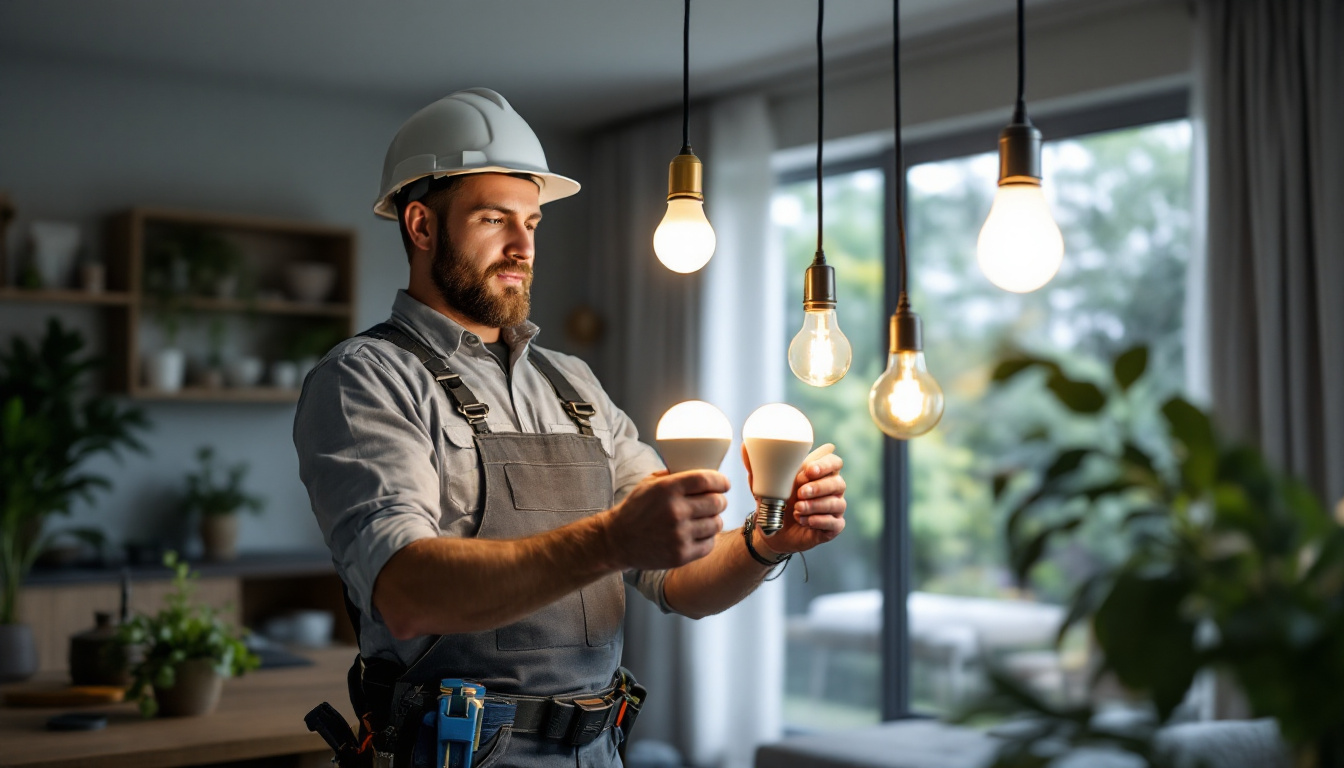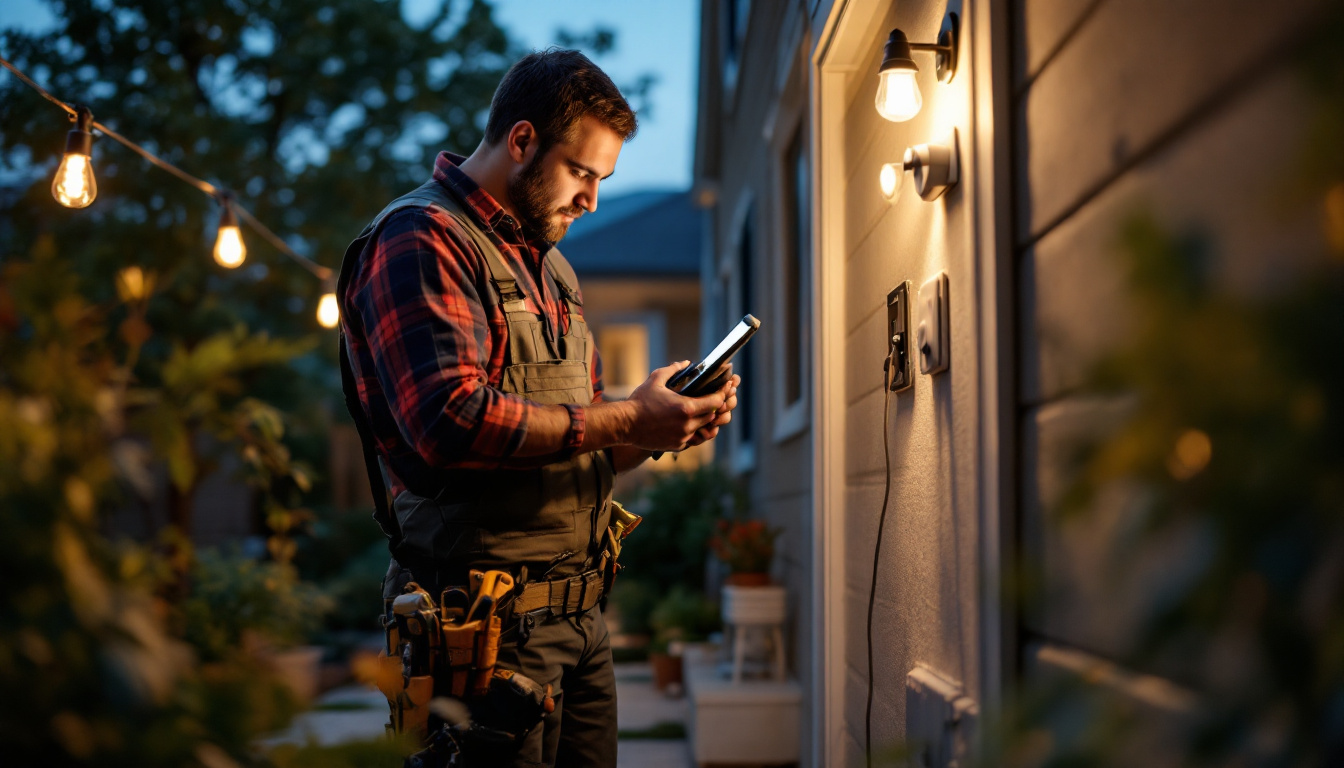

In an era where sustainability and energy efficiency are paramount, solar lamps have emerged as a crucial component in outdoor lighting solutions. For lighting contractors, understanding the benefits and applications of solar lamps is essential for staying competitive in the market. This article delves into why every lighting contractor should incorporate solar lamps into their offerings, exploring their advantages, applications, and the future of solar technology.
Solar technology has witnessed exponential growth in recent years. As more homeowners and businesses prioritize sustainability, the demand for solar-powered solutions has surged. Lighting contractors must recognize this trend and adapt their services accordingly.
Solar lamps harness the power of the sun, converting sunlight into electricity through photovoltaic cells. This renewable energy source not only reduces reliance on traditional power grids but also minimizes energy costs. As a result, solar lamps are becoming increasingly popular for outdoor lighting applications. With advancements in battery storage technology, these lamps can store energy for use during cloudy days or at night, making them a reliable option for continuous illumination.
One of the most compelling reasons for lighting contractors to embrace solar lamps is their positive environmental impact. By utilizing solar energy, these lamps significantly reduce carbon footprints. This aligns with the growing consumer preference for eco-friendly products, making solar lamps an attractive option for environmentally conscious clients.
Moreover, solar lamps contribute to reducing light pollution, as they can be designed to focus light where it is needed most. This not only enhances visibility but also preserves the natural night sky, benefiting local ecosystems. The integration of smart technology into solar lamps allows for adaptive lighting solutions that can adjust brightness based on environmental conditions, further minimizing unnecessary light dispersion and its associated ecological effects.
From a financial perspective, solar lamps present a cost-effective solution for outdoor lighting. Although the initial investment may be higher compared to traditional lighting systems, the long-term savings are substantial. Solar lamps eliminate electricity costs, and their low maintenance requirements further enhance their appeal.
In addition, many governments offer incentives and rebates for solar installations, making them even more financially viable. Lighting contractors can leverage these incentives to provide clients with attractive financing options, thereby expanding their clientele. Furthermore, as technology continues to advance, the cost of solar components is steadily decreasing, making solar lamps an increasingly accessible option for a wider range of projects, from residential gardens to commercial parking lots. This trend not only benefits contractors but also encourages more widespread adoption of renewable energy solutions across various sectors.
The versatility of solar lamps makes them suitable for a wide range of applications. Lighting contractors can explore various settings where solar lamps can be effectively utilized, enhancing their service offerings and client satisfaction.
In residential areas, solar lamps are ideal for illuminating pathways, gardens, and driveways. They provide safety and security while adding aesthetic value to outdoor spaces. Homeowners appreciate the convenience of solar lamps, as they require minimal installation and can be placed in any location that receives sunlight.
Additionally, solar garden lights can enhance the ambiance of outdoor gatherings, making them a popular choice for homeowners looking to create inviting spaces. Lighting contractors can recommend specific solar lamp models that complement the architectural style of the home, further personalizing the service. Moreover, with advancements in technology, many solar lamps now come equipped with smart features such as motion sensors and dimming capabilities, allowing homeowners to customize their lighting according to their needs and preferences. This not only contributes to energy savings but also adds a layer of convenience and security, ensuring that lights only activate when necessary.
For commercial properties, solar lamps offer a sustainable solution for parking lots, walkways, and outdoor dining areas. Businesses are increasingly adopting solar lighting to reduce operational costs while promoting their commitment to sustainability.
Lighting contractors can assist businesses in selecting the right solar lamps that meet their specific needs, such as brightness levels, design, and durability. This tailored approach not only enhances the functionality of outdoor spaces but also improves the overall customer experience. Furthermore, the use of solar lamps can serve as a marketing tool for businesses, showcasing their eco-friendly initiatives. By integrating solar lighting into their outdoor environments, companies can attract environmentally conscious consumers who value sustainability, thus enhancing their brand image and customer loyalty.
Solar lamps are also gaining traction in public spaces such as parks, playgrounds, and streetscapes. Municipalities are turning to solar lighting to enhance safety and visibility in these areas while minimizing energy consumption.
Lighting contractors can play a vital role in these projects by collaborating with local governments to design and implement solar lighting solutions that meet regulatory standards and community needs. This not only showcases the contractor’s expertise but also contributes to the betterment of the community. In addition, solar lamps in public spaces can serve as a deterrent to crime, as well-lit areas are less likely to be targeted by vandals or trespassers. The integration of solar lighting can also encourage more community engagement by making parks and recreational areas more accessible during the evening hours, thus fostering a sense of community and promoting outdoor activities among residents. With the added benefit of reduced maintenance costs associated with solar technology, municipalities can allocate funds to other essential services, further enhancing the quality of life for their citizens.
While solar lamps offer numerous benefits, lighting contractors must also be aware of the challenges associated with their installation and maintenance. Understanding these challenges can help contractors provide better service and manage client expectations.
One of the primary challenges of solar lamps is their dependence on weather conditions. In areas with limited sunlight or prolonged cloudy periods, solar lamps may not perform optimally. Lighting contractors must assess the local climate and recommend solar lamps that are designed to function effectively in various weather conditions.
Additionally, educating clients about the importance of proper placement is crucial. Ensuring that solar lamps are installed in areas that receive adequate sunlight will maximize their efficiency and lifespan. For instance, positioning lamps near reflective surfaces can enhance light distribution, while avoiding shaded areas from trees or buildings can significantly improve performance during the day.
Moreover, contractors should consider seasonal variations in sunlight availability. In regions with distinct seasons, the angle of the sun changes, which can affect how much light solar panels receive. Therefore, it may be beneficial to recommend adjustable solar fixtures that can be repositioned as needed throughout the year to adapt to these changes.
The battery life of solar lamps is another consideration for lighting contractors. Most solar lamps come equipped with rechargeable batteries that store energy for nighttime use. However, the lifespan of these batteries can vary based on usage and environmental factors.
Contractors should advise clients on the expected lifespan of the batteries and the importance of regular maintenance. This may include cleaning the solar panels to ensure optimal performance and replacing batteries as needed. By providing this information, contractors can help clients make informed decisions about their solar lamp installations. Additionally, they should discuss the different types of batteries available, such as lithium-ion versus nickel-cadmium, as each type has its own advantages and disadvantages regarding longevity, charging speed, and environmental impact.
Furthermore, educating clients on the signs of battery degradation can empower them to take proactive measures. For example, if lamps are dimming or not illuminating as brightly as they once did, it may be time to check the batteries or the solar panels for dirt and debris. By fostering a sense of ownership and responsibility in clients, contractors can enhance customer satisfaction and ensure that solar lamps continue to provide reliable lighting for years to come.
The future of solar lighting is bright, with ongoing advancements in technology and design. Lighting contractors should stay informed about emerging trends to remain competitive and offer the best solutions to their clients.
One of the most exciting developments in solar lighting is the integration of smart technology. Smart solar lamps can be controlled remotely, allowing users to adjust brightness levels, set timers, and even monitor energy consumption through mobile applications.
This innovation not only enhances convenience but also provides users with greater control over their outdoor lighting. Lighting contractors can capitalize on this trend by offering smart solar solutions that appeal to tech-savvy clients.
Advancements in solar panel efficiency and battery technology are also paving the way for more effective solar lamps. New materials and designs are being developed to maximize energy absorption and storage, resulting in brighter and longer-lasting lighting solutions.
Contractors should keep an eye on these innovations, as they can significantly impact the performance and appeal of solar lamps. By offering the latest products, contractors can position themselves as industry leaders and attract a wider client base.
Incorporating solar lamps into outdoor lighting solutions is no longer just an option for lighting contractors; it is a necessity. With their environmental benefits, cost-effectiveness, and versatility, solar lamps are poised to become a staple in the industry.
By understanding the applications, challenges, and future trends of solar lighting, contractors can enhance their service offerings and meet the evolving needs of their clients. As the demand for sustainable solutions continues to grow, lighting contractors who embrace solar technology will undoubtedly thrive in this competitive market.
Ultimately, the integration of solar lamps into outdoor lighting projects not only benefits contractors and their clients but also contributes to a more sustainable future. The time to act is now—embrace solar lighting and illuminate the path forward.
Ready to harness the power of the sun and elevate your lighting projects? LumenWholesale is your go-to source for the finest solar lamps and spec-grade lighting products. With unbeatable wholesale prices and a commitment to quality, we ensure that every lighting contractor has access to the best value in sustainable lighting solutions. Say goodbye to middleman markups and hello to hassle-free bulk buying with free shipping. Don’t compromise on quality or price—choose LumenWholesale for your next outdoor lighting endeavor. Discover our wholesale lighting selection and secure the best value for your projects today.

Discover essential insights for lighting contractors in this comprehensive guide on outdoor lighting.

Discover how innovative light bulbs are transforming the landscape for lighting contractors.

Discover how choosing the right power supply cord can give lighting contractors a competitive edge.

Discover the key challenges lighting contractors face when installing motion lights, from technical hurdles to client expectations.
Get notified when NEW deals are released.
Optimize your budget with wholesale discounts.
Only top-quality, specification-grade lighting products.
No additional costs at checkout - what you see is what you pay.
We understand the unique needs of contractors.